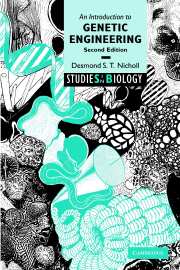
-
Select format
-
- Publisher:
- Cambridge University Press
- Publication date:
- 05 June 2012
- 07 February 2002
- ISBN:
- 9781139168205
- Dimensions:
- Weight & Pages:
- Dimensions:
- Weight & Pages:
- Subjects:
- Plant Sciences, Genetics, Life Sciences, Ecology and Conservation, Biotechnology
- Series:
- Studies in Biology
You may already have access via personal or institutional login- Subjects:
- Plant Sciences, Genetics, Life Sciences, Ecology and Conservation, Biotechnology
- Series:
- Studies in Biology
Book description
Des Nicholl presents here a new, fully revised, and expanded edition of his popular undergraduate-level textbook. Many of the features of the original edition have been retained; the book still offers a concise technical introduction to the subject of genetic engineering. However, the book is now divided into three main sections: the first introduces students to basic molecular biology, the second section explains the methods used to manipulate genes, and the third deals with modern applications of genetic engineering. A whole chapter is now devoted to the polymerase chain reaction. Applications covered in the book include genomics, protein engineering, gene therapy, cloning, and transgenic animals and plants. A final chapter discusses the ethical questions surrounding genetic engineering in general. An Introduction to Genetic Engineering is essential reading for undergraduate students of biotechnology, genetics, molecular biology and biochemistry.
Reviews
‘… easy to read, clear and well organised … I certainly recommend it for all sixth-form libraries. In addition, this is an accessible but comprehensive basic text for the undergraduate to use.’
Pauline Lowrie Source: Biology
‘An easy to follow narrative, accompanied by simple, clear diagrams, provides the interested student with the background needed … the book, therefore, fills an important niche and should be brought to the attention of upper-level undergraduate students and beginning graduate students in any branch of biology that makes use of molecular techniques.’
Source: ASM News
Contents
Metrics
Altmetric attention score
Full text views
Full text views help Loading metrics...
Loading metrics...
* Views captured on Cambridge Core between #date#. This data will be updated every 24 hours.
Usage data cannot currently be displayed.
Accessibility standard: Unknown
Why this information is here
This section outlines the accessibility features of this content - including support for screen readers, full keyboard navigation and high-contrast display options. This may not be relevant for you.
Accessibility Information
Accessibility compliance for the PDF of this book is currently unknown and may be updated in the future.


